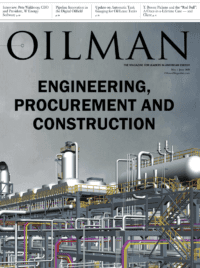The Role of EPC
Engineering Procurement Construction (EPC) companies are essentially the hands and feet of any major oil and gas new construction operation. An EPC is absolutely necessary for companies to build new facilities or make changes and additions to existing ones. From conception to turnover, they are designing, building, procuring, constructing, and commissioning to ensure a smooth operation. It’s imperative that every “i” is dotted and every “t” is crossed, as major oil and chemical companies are entrusting them with their biggest assets.
Originally, the focus of this feature article was on the role of the EPC company, which encompasses the vast majority of what brings an oil and gas operation to fruition. Usually the hidden figure behind the publicity of a successful start-up, their role does not go unnoticed to those behind the scenes. In exploring this topic and the vital role of the EPC, we were hit with the COVID-19 onslaught. So, to take the feature subject further, what happens to an EPC in the middle of a pandemic? That is the million dollar question (literally) we’ll be exploring here.
The Gulf of Mexico and surrounding areas are no stranger to shut-downs and emergency protocol due to catastrophic events. June to November is hurricane season along the gulf coast and oil and gas professionals are seasoned at the way things transpire in this sort of crisis – it’s a learned part of the trade. Hurricanes can shut down operations for weeks due to evacuations and storms and after-effects of storms. But what happens when operations don’t shut down, but the entire country shuts down around it? That is a scenario in which no one has ever experienced in their lifetime. So many questions, so many unknowns.
Alfred Miller Contracting
Alfred Miller Contracting is a small-scale EPC headquartered in Lake Charles, Louisiana. It designs and constructs buildings for petrochemical facilities. With designers and engineers on staff, it manufactures precast concrete elements in its PCI and NPCA certified facility on site. Major LNG facilities located close-by in Cameron Parish, Louisiana, are at an advantage because they can hire Alfred Miller and, in turn, have an EPC locally. Its services encompass fireproofing, specialty precast, buildings, and field services for a complete package.
Alfred Miller constructs buildings that can withstand 16 hours of fire resistance and last over 100 years. They are made to endure blasts, explosions, projectiles, noise, earthquakes, hurricanes, and tornados. The buildings are mainly constructed from precast concrete made in Alfred Miller’s plant. The pieces are then shipped to the facility and erected. Because of the efficiency, speed of construction, versatility, inherent fire resistance, and durability of precast concrete, it is an ideal building system for industrial facilities. The buildings are typically completed in fewer man-hours and 40 percent less time than steel or masonry structures.
Fireproofing does not produce revenue for a plant; however, it is required for safety and protection of the assets that do produce revenue. Alfred Miller applies all types of fireproofing for the downstream petrochemical industry: epoxy intumescent, cementitious or concrete. It is a single point of responsibility for all shop-applied and field fireproofing. It holds several U.S. patents on fireproofing systems and UL 1709 certifications on those systems. The innovations and the Toyota-esque Lean Production System enables it to process over 1,000 tons of steel at any given time. On site are two highly efficient, climate-controlled fireproofing shops that are 6,000 square foot moving buildings, so instead of moving the steel-work, the process is moved over the steel.
The yard at Alfred Miller is a busy place. One side dedicated to precast and the other to fireproofing, there is rarely a dull moment and its staff has it working like a well-oiled machine. From laborers, to management, and everything in between, all adhering to quality and safety – it’s the full package.
So, what happens to a company like this one and so many others, when a pandemic hits the country? A lot of trial and error. Since no one has ever experienced this in their lifetime, there has been a lot of confusion. There are plenty of problems in the workforce due to the pandemic; the ones we’ll explore, however, will be related to the role of the EPC. Most EPCs that work for the petrochemical industry are deemed “essential operations” which means that they will stay working and in business, despite the country shutting down around them. While thankful for having an “essential” status, problems arise when situational difficulties force workforce reduction.
Schools and Daycares
When the businesses, restaurants, etc. close and parents are off work, it’s not a problem if schools and daycares close because parents are capable of providing their own childcare. However, if parents are still working and they don’t have a spouse that is off, then they cannot work due to lack of childcare.
Fear
Alfred Miller took all necessary precautions imposed by the CDC to protect its employees. Masks, gloves, thermometers for temperature checks, and antibacterial wipes and hand sanitizer by the pallets. The company spared no expense for the safety of its personnel. However, some employees were more fearful than others – for reasons of being immune-compromised, or elderly, or having children or spouses at home that were immune-compromised – which resulted in personnel choosing to stay at home rather than taking any chances by going to work.
Unemployment Insurance
For some personnel, the numbers didn’t add up. With the passage of the $2.2 trillion stimulus package, which includes an extra $600/week in unemployment benefits, some employees figured out that more money could be made on unemployment than could be made by actually working a full week. It made more sense to stay home than to go to work and make less money.
Fairness and Compensation
Some people that have the ability to work from home are given the option to do so. But that leaves a bad taste in the mouth for those that do not have the ability to work from home and must stay at the workplace. There have been many jokes about who is “essential” and who is “unessential,” but the issue is real. Those staying at work are looking at those staying home as receiving a paid vacation from the company. Even though this is not the case and only a result of the circumstances, it causes resentment among employees. Some companies are compensating essential personnel with extra pay to reward their dedication.
Conclusion
An essential business is expected to operate as normal. Production does not stop because of a crisis and schedules are expected to be kept. When you have a 40 percent reduction in personnel, your milestone schedule is bound to take a hit. Every effort has been made to maintain some sort of normalcy in these strange times. More time is spent trying to seek out and hire quality personnel when in the past (a couple of months ago) potential employees were pounding the streets looking for work.
The New York Times posted an article on April 23, 2020 titled “The $600 Unemployment Booster Shot, State by State.” In the article it states, “Unemployment benefits are typically meant to keep people afloat but stay low enough to incentivize them to find a job. Now, when seeking work may be both fruitless and dangerous, the incentives have nearly reversed.” It is too soon to tell whether the overall effect of the stimulus will have a positive or negative impact on the economy. There are pros and cons to it, but to essential companies, it has been a serious burden to find employees willing to work.
Alfred Miller constructs buildings that are immune from virtually any catastrophic event. Unfortunately, their concrete walls cannot stop a virus. It, along with other EPCs, is taking things day-by-day, doing what it can to protect employees, while keeping their schedules.
“We are sparing no expense creating internal projects, upgrading our facilities and equipment. We are also working on improving our processes to be more prepared and efficient once this is over,” says Philip Miller, Alfred Miller Contracting Owner and President. Working day and night to stagger personnel and not slow production. Trial and error. Trying to see what works and what doesn’t. There are so many unknowns and everyone involved is doing the best they can to get through the “mess,” which probably is an accurate word. The general consensus is that we have all learned lessons and developed protocols in the event something like this comes along again. We all hope that the COVID-19 crisis is a thing of the past, but we will be a little more prepared next time in the event of a pandemic.
Many things addressed in this article seem to lean toward the negative, but there is so much positive. The industry as a whole is thankful that it is deemed essential, when some companies would give anything to have that title. Challenging is a more accurate depiction than negative. Yes, it is a challenge to navigate something that affects the entire nation and has never been experienced before, but lessons are being learned and as a nation and an industry, we will prevail. That’s what makes this country and our people great.
In the process of researching and writing this article, oil dropped below $0 a barrel. From oil companies to EPCs, no one is immune. The unknown is scary and this is downright terrifying for this industry. Oil and gas have seen more than their fair share of downs; over time, we will come back up. We must take each day as it comes, keep our nose to the grindstone, and do what we can. This, too, shall pass.
Headline photo courtesy of Alfred Miller Contracting – Alfred Miller Yard, Lake Charles, LA
Sarah Skinner is a graduate of Louisiana State University with a degree in English. She has been a technical writer and editor in the oil and gas industry for over ten years in Houston and in Louisiana. She currently works as a technical writer for a pre-cast concrete construction company in Louisiana that builds blast-proof buildings for petrochemical plants.







